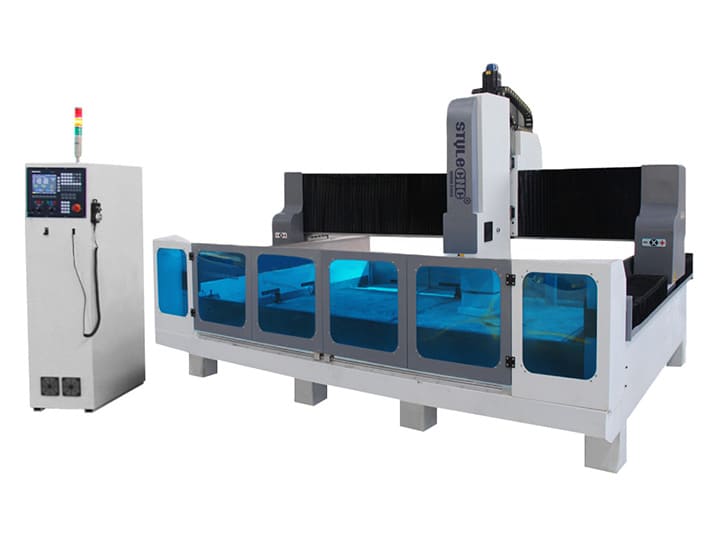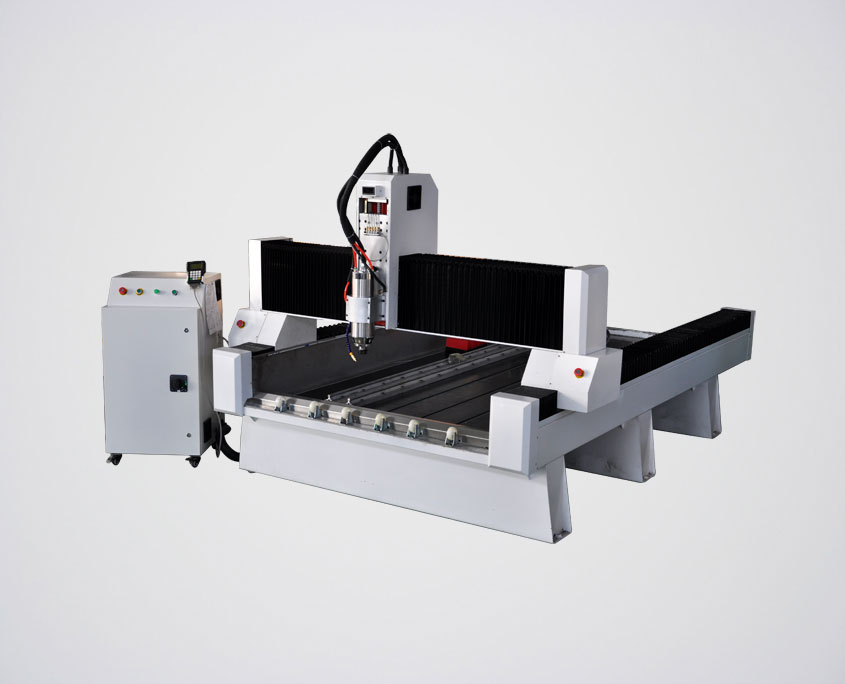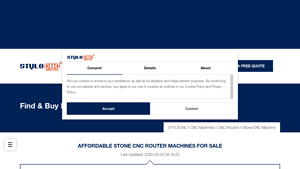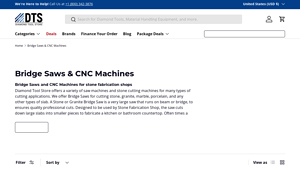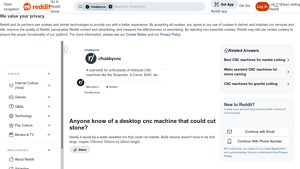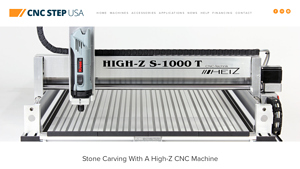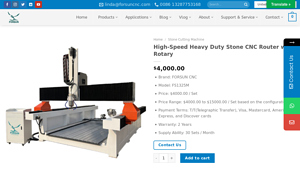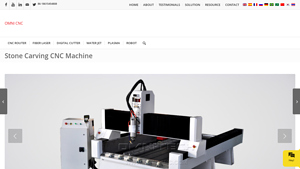Introduction: Navigating the Global Market for cnc stone cutting machine
In the competitive landscape of stone fabrication, sourcing a CNC stone cutting machine that meets both operational and budgetary requirements poses a significant challenge for B2B buyers. As industries across Africa, South America, the Middle East, and Europe (including key markets like Germany and Brazil) strive for efficiency and precision, understanding the nuances of CNC technology becomes crucial. This guide delves into the diverse types of CNC stone cutting machines available, their various applications—from creating intricate sculptures to fabricating countertops—and the essential considerations for supplier vetting.
Navigating the complexities of the global market can be daunting, especially with the myriad of options and specifications. This comprehensive resource empowers international buyers by providing insights into cost structures, machine capabilities, and the latest technological advancements. By equipping decision-makers with the knowledge necessary to evaluate machines and suppliers effectively, this guide aims to facilitate informed purchasing decisions that enhance productivity and profitability.
Whether you are looking to invest in high-end 5-axis CNC machines or more affordable models tailored for specific applications, understanding the market landscape is vital. This guide is designed to streamline the procurement process, ensuring that you select the best CNC stone cutting machine to meet your unique business needs.
Understanding cnc stone cutting machine Types and Variations
| Type Name | Key Distinguishing Features | Primary B2B Applications | Brief Pros & Cons for Buyers |
|---|---|---|---|
| CNC Stone Router | Fully automatic, compatible with CAD/CAM, 3D dynamic simulation | Custom sculptures, signage, home decor | Pros: High precision, versatile; Cons: Higher initial cost |
| Bridge Saw | Large saw on a beam for cutting thick slabs, high stability | Kitchen countertops, large format stone cutting | Pros: Efficient for large pieces; Cons: Requires space |
| 5-Axis CNC Machine | Multi-directional cutting, advanced shaping capabilities | Complex designs, artistic stone works | Pros: Exceptional detail; Cons: More complex operation |
| CNC Stone Polishing Machine | Combines cutting and polishing functions, often multi-head | Finishing surfaces of countertops and tiles | Pros: Dual functionality; Cons: Potentially higher maintenance |
| Desktop CNC Stone Carving Machine | Compact size, suitable for small projects, user-friendly | Jewelry, small sculptures, educational purposes | Pros: Affordable, space-efficient; Cons: Limited capabilities |
What Are the Key Characteristics of CNC Stone Routers?
CNC stone routers are fully automated machines designed for precise carving and cutting of various stone types, including marble and granite. They typically integrate with CAD/CAM software, allowing for intricate designs and detailed sculptures. This type of machine is particularly suitable for businesses focused on custom art, signage, and home décor. When purchasing a CNC stone router, buyers should consider the machine’s compatibility with design software, its tool lifespan, and the level of customer support offered by the manufacturer.
How Do Bridge Saws Stand Out in Stone Cutting?
Bridge saws are characterized by their robust structure, featuring a large saw mounted on a beam that allows for cutting thick stone slabs with precision. These machines are essential for fabricating kitchen countertops and other large stone applications. Buyers should evaluate the saw’s cutting capacity, ease of operation, and the space required for installation. While bridge saws excel in efficiency for larger projects, they may necessitate significant floor space in fabrication shops.
What Advantages Do 5-Axis CNC Machines Offer?
5-axis CNC machines provide multi-directional cutting capabilities, enabling the creation of complex shapes and designs that are difficult to achieve with standard machines. This makes them ideal for artistic stone works and intricate architectural elements. When considering a 5-axis CNC machine, businesses should assess the complexity of their design needs, the skill level of their operators, and the machine’s maintenance requirements. While they offer exceptional detail, their operation can be more complex, necessitating skilled personnel.
Why Invest in CNC Stone Polishing Machines?
CNC stone polishing machines combine cutting and polishing functions, allowing for the finishing of surfaces in one integrated process. These machines are particularly beneficial for businesses that focus on countertop fabrication and tile finishing. When investing in a polishing machine, buyers should consider its polishing efficiency, the range of materials it can handle, and potential maintenance costs. While the dual functionality is advantageous, it may lead to higher maintenance requirements over time.
How Do Desktop CNC Stone Carving Machines Fit into the Market?
Desktop CNC stone carving machines are compact and designed for smaller projects such as jewelry making and educational purposes. They are user-friendly and often more affordable, making them accessible for startups and hobbyists. Buyers should evaluate the machine’s capabilities, software compatibility, and the types of materials it can work with. While these machines are space-efficient and cost-effective, they may lack the power and versatility of larger industrial machines.
Key Industrial Applications of cnc stone cutting machine
| Industry/Sector | Specific Application of CNC Stone Cutting Machine | Value/Benefit for the Business | Key Sourcing Considerations for this Application |
|---|---|---|---|
| Construction & Architecture | Custom Countertops and Vanity Tops | Enhances aesthetic appeal and functionality in residential and commercial projects. | Precision cutting capabilities, material compatibility, and after-sales support. |
| Monument & Memorial Industry | Headstone and Tombstone Fabrication | Enables high-quality, personalized memorial products that meet customer expectations. | Customization options, engraving capabilities, and durability of machines. |
| Art & Sculpture | Artistic Stone Sculptures and Installations | Provides unique artistic designs that differentiate businesses in the market. | Versatility in design software integration and tool variety for different stone types. |
| Interior Design & Home Decor | Decorative Stone Panels and Features | Adds value to interior spaces through unique stone features, increasing market appeal. | Ability to handle various stone materials and ensure high finish quality. |
| Landscaping & Outdoor Design | Stone Pavers and Garden Features | Offers durable and visually appealing solutions for outdoor spaces. | Machine size and portability, as well as precision cutting for intricate designs. |
In the Construction & Architecture sector, CNC stone cutting machines are primarily used for fabricating custom countertops and vanity tops from materials like granite and quartz. This application addresses the need for precision and consistency in dimensions, which is crucial for fitting in various spaces. Buyers in this sector should focus on machines that offer high accuracy, compatibility with different stone types, and robust after-sales support to ensure long-term productivity.
The Monument & Memorial Industry utilizes CNC machines for headstone and tombstone fabrication, allowing for intricate designs and personalized engravings. This application solves the challenge of meeting unique customer requests while maintaining high-quality standards. International buyers should consider the customization options available, the machine’s engraving capabilities, and the durability of the equipment to ensure it can withstand continuous use in a demanding environment.
In the Art & Sculpture industry, CNC stone cutting machines are employed to create artistic stone sculptures and installations. These machines enable artists and fabricators to produce unique designs that stand out in a competitive market. Buyers should prioritize machines that offer flexibility in design software integration and a variety of tools to accommodate different stone types, ensuring they can bring their creative visions to life.
For Interior Design & Home Decor, CNC stone cutting machines facilitate the production of decorative stone panels and features, which enhance the aesthetic appeal of residential and commercial spaces. This application adds significant value to properties, making them more attractive to potential buyers or renters. When sourcing machines, buyers should look for those capable of handling various stone materials and providing high-quality finishes to meet client expectations.
Lastly, in the Landscaping & Outdoor Design sector, CNC machines are used to fabricate stone pavers and garden features, providing durable and visually appealing solutions for outdoor spaces. This application addresses the growing demand for customized outdoor designs that enhance property value. Buyers should consider the machine’s size and portability, as well as its precision cutting capabilities for intricate designs, to ensure it meets their specific project requirements.
3 Common User Pain Points for ‘cnc stone cutting machine’ & Their Solutions
Scenario 1: Navigating High Initial Costs of CNC Stone Cutting Machines
The Problem: Many B2B buyers face the daunting challenge of high upfront costs associated with purchasing CNC stone cutting machines. This is particularly prevalent among small to medium-sized enterprises (SMEs) in regions like Africa and South America, where budget constraints limit their ability to invest in advanced technology. The financial burden can deter businesses from upgrading their equipment, leading to reliance on outdated machinery that hampers productivity and quality.
The Solution: To alleviate the financial strain, buyers should consider a phased investment approach. Instead of purchasing a high-end machine outright, companies can explore leasing options or financing plans that spread costs over time. Additionally, it’s crucial to conduct thorough market research to identify manufacturers that offer cost-effective solutions without compromising on quality. Collaborating with local distributors can also provide insights into second-hand machines that are still in excellent condition, allowing businesses to access advanced technology at a fraction of the cost. Furthermore, investing in training for existing staff can optimize the use of current machinery, enhancing productivity until a new machine can be acquired.
Scenario 2: Overcoming Technical Skill Gaps in CNC Operation
The Problem: A significant challenge many buyers encounter is the lack of skilled operators who can effectively run CNC stone cutting machines. In regions like the Middle East and parts of Europe, the rapid technological advancements in CNC machinery outpace the availability of trained personnel. This gap can lead to operational inefficiencies, increased downtime, and costly errors, ultimately impacting a company’s bottom line.
The Solution: Companies should prioritize investing in comprehensive training programs for their existing workforce. Partnering with equipment manufacturers for hands-on training sessions can equip employees with the necessary skills to operate CNC machines proficiently. Additionally, establishing a mentorship program where experienced operators guide newer staff can foster a culture of continuous learning. Businesses can also look into online courses or certifications specific to CNC operations to enhance their team’s technical capabilities. By fostering a skilled workforce, companies can maximize the return on their CNC investments and reduce the likelihood of costly mistakes.
Scenario 3: Ensuring Consistent Quality Control in Stone Cutting
The Problem: Quality control is a critical concern for B2B buyers of CNC stone cutting machines, particularly in sectors such as construction and home improvement. Inconsistent cutting quality can lead to product wastage, customer dissatisfaction, and reputational damage. Companies operating in competitive markets, especially in Europe, must maintain high standards to differentiate themselves from competitors.
The Solution: Implementing a robust quality control system is essential for maintaining consistent output. Buyers should invest in CNC machines equipped with advanced software that offers real-time monitoring and diagnostics. This technology can help identify potential issues before they escalate, ensuring that the cutting process meets predefined quality standards. Additionally, establishing a regular maintenance schedule for the machines can prevent wear and tear that affects performance. Employing statistical process control (SPC) techniques can also help in tracking the production process and identifying variations in quality. By proactively addressing quality control, businesses can enhance their operational efficiency and customer satisfaction, ultimately leading to increased loyalty and sales.
Strategic Material Selection Guide for cnc stone cutting machine
What Materials Are Commonly Used in CNC Stone Cutting Machines?
When selecting materials for CNC stone cutting machines, it is essential to consider their properties, advantages, disadvantages, and suitability for specific applications. Below, we analyze four common materials used in the construction of these machines: steel, aluminum, cast iron, and composite materials.
How Does Steel Impact the Performance of CNC Stone Cutting Machines?
Steel is a widely used material in CNC stone cutting machines due to its strength and durability. It typically has a high tensile strength, making it capable of withstanding the high pressures and vibrations associated with stone cutting. Steel’s resistance to deformation under stress is a significant advantage, ensuring precision in cutting operations.
Pros: Steel offers excellent durability and is relatively cost-effective. It can be easily machined and welded, allowing for complex designs. Additionally, steel components can be treated for corrosion resistance, enhancing their longevity.
Cons: On the downside, steel can be heavy, which may complicate machine mobility and installation. It also requires regular maintenance to prevent rust and corrosion, particularly in humid environments.
Impact on Application: Steel is compatible with various cutting media, including granite, marble, and quartz. However, buyers should ensure that the steel used meets international standards for quality and safety.
What Role Does Aluminum Play in CNC Stone Cutting Machines?
Aluminum is another popular material for CNC machines, particularly for components that require lower weight without sacrificing strength. It has good corrosion resistance and can be anodized for additional protection.
Pros: The lightweight nature of aluminum makes it easier to handle and transport. Its excellent thermal conductivity helps dissipate heat during cutting operations, which can improve tool life.
Cons: However, aluminum is generally less rigid than steel, which may affect precision in high-stress applications. It can also be more expensive than steel, depending on the alloy used.
Impact on Application: Aluminum is suitable for lighter stone materials and applications where mobility is essential. B2B buyers should consider the specific alloys used, as they can significantly impact performance.
Why Is Cast Iron Preferred in Some CNC Stone Cutting Machines?
Cast iron is often chosen for its exceptional damping properties, which help absorb vibrations during cutting. This material is known for its stability and resistance to deformation, making it ideal for heavy-duty applications.
Pros: Cast iron machines tend to have a longer lifespan due to their durability and resistance to wear. The material’s vibration-damping characteristics can lead to improved cutting accuracy.
Cons: The main drawback is its weight, which can limit mobility and increase shipping costs. Additionally, cast iron can be brittle, making it susceptible to cracking under extreme stress.
Impact on Application: Cast iron is particularly effective for cutting harder stones like granite. Buyers should ensure that the cast iron components comply with international standards to avoid issues with brittleness.
How Do Composite Materials Enhance CNC Stone Cutting Machines?
Composite materials, often a blend of plastic and metal, are increasingly being used in CNC machines. They offer a unique combination of lightweight properties and strength.
Pros: Composites are resistant to corrosion and can be manufactured to specific tolerances, enhancing precision. They also reduce the overall weight of the machine, making it easier to transport.
Cons: However, composites can be more expensive than traditional materials and may not offer the same level of rigidity as steel or cast iron. Their performance can also vary significantly based on the specific formulation.
Impact on Application: Composite materials are suitable for a range of applications, particularly where weight savings are essential. Buyers should verify the material specifications to ensure they meet performance requirements.
Summary Table of Material Selection for CNC Stone Cutting Machines
| Material | Typical Use Case for cnc stone cutting machine | Key Advantage | Key Disadvantage/Limitation | Relative Cost (Low/Med/High) |
|---|---|---|---|---|
| Steel | Heavy-duty cutting of granite and marble | High strength and durability | Heavy and requires maintenance | Medium |
| Aluminum | Lightweight applications, mobile machines | Lightweight and good corrosion resistance | Less rigid than steel | Medium to High |
| Cast Iron | Precision cutting of hard stones | Excellent vibration damping | Heavy and brittle | Medium |
| Composite | Versatile applications with weight constraints | Corrosion resistant and lightweight | Higher cost and variable performance | High |
This strategic material selection guide provides valuable insights for international B2B buyers, enabling them to make informed decisions based on their specific needs and regional considerations.
In-depth Look: Manufacturing Processes and Quality Assurance for cnc stone cutting machine
What Are the Main Stages of the Manufacturing Process for CNC Stone Cutting Machines?
The manufacturing process for CNC stone cutting machines involves several key stages that ensure precision, durability, and performance. Understanding these stages is critical for B2B buyers looking to invest in high-quality machinery.
1. Material Preparation
The first stage begins with material selection, where high-quality raw materials such as steel and aluminum are sourced. These materials are then cut to size using precision cutting tools to meet specific design specifications. In addition, components such as motors, electronics, and cooling systems are sourced from reputable suppliers to ensure reliability. This step is crucial, as the quality of materials directly impacts the machine’s performance and longevity.
2. Forming and Machining
Once the materials are prepared, the next step involves forming and machining. This includes processes such as CNC machining, where computer-controlled tools shape the components with high precision. Techniques such as laser cutting and water jet cutting are often employed to create intricate parts with minimal tolerance for error. Additionally, forming processes like bending and welding are used to assemble larger components, ensuring they are robust enough to handle the stresses of operation.
3. Assembly
The assembly stage is where the machine begins to take its final form. Individual components, including the frame, spindle, and control systems, are meticulously assembled. This process often involves both manual assembly and robotic automation to ensure accuracy. Quality control measures are integrated into this stage, with each assembly being checked for alignment and fit before moving on to the next phase.
4. Finishing
Finishing touches are applied to enhance both aesthetics and functionality. This includes painting, coating, and polishing, which not only protect the machine from corrosion but also improve its appearance. Additionally, this stage involves the installation of safety features, such as emergency stops and protective covers, to comply with international safety standards.
How Is Quality Assurance Implemented in CNC Stone Cutting Machine Manufacturing?
Quality assurance (QA) is a critical aspect of the manufacturing process for CNC stone cutting machines. It ensures that the machines meet both industry standards and customer expectations.
Relevant International Standards: What Should Buyers Look For?
B2B buyers should be aware of several international quality standards that CNC stone cutting machines should comply with. ISO 9001 is a widely recognized standard that outlines requirements for a quality management system, ensuring that manufacturers consistently provide products that meet customer and regulatory requirements. Other certifications, such as CE marking for European markets, indicate compliance with safety and health regulations. Buyers in specific industries may also look for additional certifications, such as API (American Petroleum Institute) for machines used in oil and gas applications.
What Are the Key Quality Control Checkpoints?
Quality control in CNC machine manufacturing involves several critical checkpoints:
-
Incoming Quality Control (IQC): At this initial stage, raw materials and components are inspected for quality before they enter the manufacturing process. This includes checking for defects and ensuring materials meet specified standards.
-
In-Process Quality Control (IPQC): During the manufacturing process, regular inspections are conducted to monitor the production line. This helps identify any deviations from standards early, reducing waste and ensuring consistent quality.
-
Final Quality Control (FQC): After assembly, each machine undergoes a thorough inspection and testing process. This includes functional testing, performance evaluations, and safety checks to ensure the machine operates as intended.
What Common Testing Methods Are Used to Ensure Quality?
Several testing methods are employed to ensure the quality of CNC stone cutting machines:
-
Functional Testing: This involves running the machine through its operational parameters to verify that all systems function correctly.
-
Dimensional Testing: Precision is critical in CNC machines. Dimensional testing ensures that all parts meet specified tolerances and that the machine can produce accurate cuts and engravings.
-
Stress Testing: Machines are subjected to extreme conditions to test their durability and reliability. This simulates real-world usage and helps identify potential points of failure.
How Can B2B Buyers Verify Supplier Quality Control?
For B2B buyers, verifying a supplier’s quality control processes is essential to ensure they are investing in reliable machinery. Here are some strategies to consider:
-
Supplier Audits: Conducting on-site audits allows buyers to evaluate the manufacturing processes and quality control measures in place. This firsthand observation can provide valuable insights into the supplier’s commitment to quality.
-
Quality Control Reports: Requesting detailed quality control reports can help buyers understand the testing methods used and the results of past inspections. This documentation serves as a record of the supplier’s adherence to quality standards.
-
Third-Party Inspections: Engaging third-party inspection services can provide an unbiased assessment of the supplier’s quality assurance processes. These inspections can be particularly beneficial for international buyers who may not be able to conduct audits themselves.
What Are the Quality Control and Certification Nuances for International Buyers?
International buyers, especially those from regions like Africa, South America, the Middle East, and Europe, should be aware of specific nuances in quality control and certification:
-
Compliance with Local Regulations: Different regions may have varying regulations and standards. It is essential for buyers to understand the local requirements and ensure that the machinery complies with them.
-
Language and Documentation Barriers: Buyers should ensure that all documentation, including quality certificates and operating manuals, are available in a language they understand. This can prevent misunderstandings and ensure proper usage and maintenance of the machinery.
-
Logistics and Shipping Considerations: Quality assurance does not end at the factory. Buyers should consider how the machine will be transported and installed. Ensuring that suppliers have robust packaging and shipping practices can help maintain quality during transit.
In summary, understanding the manufacturing processes and quality assurance protocols for CNC stone cutting machines is crucial for B2B buyers. By focusing on the stages of manufacturing, relevant standards, quality control checkpoints, testing methods, and verification strategies, buyers can make informed decisions that align with their operational needs and ensure the longevity of their investments.
Practical Sourcing Guide: A Step-by-Step Checklist for ‘cnc stone cutting machine’
Introduction
This practical sourcing guide aims to assist B2B buyers in effectively procuring CNC stone cutting machines. With the increasing demand for precision in stone fabrication across various industries, understanding the critical steps involved in the purchasing process is essential. This checklist will help ensure you make informed decisions that align with your operational needs and budget.
Step 1: Define Your Technical Specifications
Before initiating the procurement process, it’s vital to clearly define your technical requirements. Consider the types of materials you will be cutting, such as granite, marble, or quartz, and the complexity of the designs you wish to create. This clarity will guide you in selecting a machine with the appropriate capabilities and features.
- Material Compatibility: Ensure the machine can handle the specific types of stone you work with.
- Axis Configuration: Determine whether you need a 3-axis, 4-axis, or 5-axis machine based on the intricacies of your projects.
Step 2: Set a Budget and Evaluate Cost
Establishing a budget is crucial to avoid overspending. CNC stone cutting machines come with a wide range of prices depending on their features and specifications. Understanding your financial limits will help narrow down options that offer the best value for your investment.
- Consider Total Cost of Ownership: Factor in maintenance, tooling, and operational costs over time.
- Look for Financing Options: Some suppliers offer financing plans that can ease the upfront investment burden.
Step 3: Research Potential Suppliers
Conduct thorough research to identify reliable suppliers. Look for manufacturers with a proven track record in the industry, and consider their reputation and customer reviews. This step is essential to ensure that you partner with a trustworthy supplier who can meet your needs.
- Supplier Experience: Check how long they have been in the market and their expertise in CNC technology.
- Customer Testimonials: Seek feedback from other buyers, especially those in similar regions or industries.
Step 4: Verify Supplier Certifications
It’s important to verify that your chosen suppliers have the necessary certifications and comply with international standards. This can provide assurance of product quality and safety, which is particularly crucial when purchasing heavy machinery.
- ISO Certifications: Look for ISO 9001 or relevant certifications that indicate quality management systems.
- Compliance with Local Regulations: Ensure they meet any specific regulations or standards in your region.
Step 5: Request Demonstrations and Samples
Before finalizing your purchase, request product demonstrations or samples if possible. This step allows you to assess the machine’s capabilities firsthand and understand how it operates in a real-world setting.
- Test Cuts: If feasible, conduct test cuts on materials similar to what you will be using.
- Evaluate User Interface: Assess the ease of use and the learning curve associated with operating the machine.
Step 6: Negotiate Terms and Warranty Options
Once you have selected a potential supplier, engage in negotiations regarding pricing, payment terms, and warranty options. A well-negotiated agreement can provide additional value and protection for your investment.
- Warranty Coverage: Ensure you understand what the warranty includes and the duration.
- Service Agreements: Consider service packages that cover maintenance and repairs to minimize downtime.
Step 7: Finalize the Purchase and Arrange Logistics
After negotiating terms, finalize your purchase agreement and plan for logistics. Ensure you have a clear understanding of delivery timelines and setup requirements.
- Shipping Arrangements: Confirm shipping methods and costs, especially if importing from another region.
- Installation Support: Verify if the supplier provides installation and training services to ensure proper setup and operation.
By following this checklist, you can streamline your procurement process for CNC stone cutting machines, ensuring you make informed decisions that enhance your operational efficiency.
Comprehensive Cost and Pricing Analysis for cnc stone cutting machine Sourcing
What Are the Key Cost Components Involved in CNC Stone Cutting Machine Sourcing?
When sourcing CNC stone cutting machines, understanding the cost structure is crucial for effective budgeting and negotiation. The primary cost components include:
-
Materials: The quality and type of materials used in the machine’s construction significantly influence the price. High-grade steel, advanced electronics, and durable components typically lead to higher costs but ensure longevity and reliability.
-
Labor: Labor costs encompass both direct and indirect expenses related to production. Skilled labor is essential for assembly, programming, and maintenance, which can vary significantly based on geographical location and market conditions.
-
Manufacturing Overhead: This includes costs related to factory operations, such as utilities, rent, and equipment depreciation. Efficient manufacturing processes can help reduce these overheads, impacting the final pricing.
-
Tooling: The tooling required for CNC machines, including router bits and cutting tools, adds to the initial investment. The choice of tooling can also affect the machine’s performance and the types of materials it can effectively cut.
-
Quality Control (QC): Implementing stringent QC measures ensures that the machines meet industry standards and customer specifications. Investing in quality assurance can lead to higher upfront costs but reduces the risk of defects and returns.
-
Logistics: Shipping and handling costs vary based on the machine’s size, weight, and destination. International shipping may involve tariffs and customs duties, which should be factored into the total cost.
-
Margin: Suppliers typically add a profit margin to their costs, which can vary based on competition and market demand. Understanding typical margins in the industry can provide insights for negotiation.
How Do Price Influencers Impact CNC Stone Cutting Machine Costs?
Several factors can influence the pricing of CNC stone cutting machines, particularly for international buyers:
-
Volume/MOQ: Purchasing in bulk often leads to significant discounts. Manufacturers may offer lower prices per unit for higher order quantities, making it beneficial for companies looking to scale operations.
-
Specifications and Customization: Customized machines tailored to specific needs can drive up costs. Buyers should weigh the benefits of customization against the price increase and assess if standard models meet their requirements.
-
Material Quality and Certifications: Machines built from high-quality materials and those that meet international safety and performance certifications typically come at a premium. Buyers should consider the long-term benefits of investing in certified equipment.
-
Supplier Factors: The reputation and reliability of the supplier can impact pricing. Established suppliers may charge more due to their proven track record, while newer suppliers might offer competitive pricing to gain market share.
-
Incoterms: Understanding international commercial terms (Incoterms) is essential for calculating total costs. Terms like FOB (Free on Board) or CIF (Cost, Insurance, and Freight) can significantly affect the overall price and logistics planning.
What Buyer Tips Can Help in Negotiating CNC Stone Cutting Machine Prices?
International buyers, particularly from regions like Africa, South America, the Middle East, and Europe, should consider the following tips to enhance their purchasing strategy:
-
Negotiate: Always negotiate prices and terms. Many suppliers expect negotiation and may have flexibility in their pricing, especially for large orders or repeat business.
-
Focus on Cost-Efficiency: Evaluate the total cost of ownership (TCO), which includes initial purchase price, operational costs, maintenance, and potential downtime. A lower upfront cost may lead to higher long-term expenses.
-
Understand Pricing Nuances: Be aware of regional pricing trends and market conditions that can affect costs. Prices may vary significantly based on local demand and competition, so conducting market research can provide leverage during negotiations.
-
Request Multiple Quotes: Obtaining quotes from several suppliers can help buyers identify competitive pricing and better understand the market landscape. This practice also aids in establishing a benchmark for negotiations.
-
Consider After-Sales Support: Evaluate the level of after-sales support provided by suppliers. A machine may be cheaper initially, but lack of support can lead to increased costs and operational disruptions down the line.
Disclaimer on Indicative Prices
Prices for CNC stone cutting machines can vary widely based on the factors discussed. The figures mentioned in various listings are indicative and may fluctuate based on market conditions, supplier negotiations, and specific machine configurations. Buyers should conduct thorough research and consult with multiple suppliers to obtain accurate pricing tailored to their unique needs.
Alternatives Analysis: Comparing cnc stone cutting machine With Other Solutions
Understanding Alternatives to CNC Stone Cutting Machines
When evaluating options for stone cutting and fabrication, businesses often consider various methods and technologies. The choice of equipment can significantly impact operational efficiency, production quality, and overall costs. This section provides a comparative analysis of CNC stone cutting machines against two viable alternatives: traditional bridge saws and water jet cutting machines. By understanding the strengths and weaknesses of each option, B2B buyers can make informed decisions tailored to their specific operational needs.
Comparison Table
| Comparison Aspect | CNC Stone Cutting Machine | Traditional Bridge Saw | Water Jet Cutting Machine |
|---|---|---|---|
| Performance | High precision, versatile for complex designs | Good for straight cuts, less precision for intricate designs | Excellent precision, can cut various materials |
| Cost | Higher initial investment, but lower operational costs | Moderate initial cost, higher labor costs | High initial investment and operational costs |
| Ease of Implementation | Requires skilled operators and software integration | Easier to set up, requires manual labor | Complex setup and maintenance needs |
| Maintenance | Regular maintenance needed, but less frequent | Requires frequent blade changes and maintenance | High maintenance due to pump systems |
| Best Use Case | Complex designs, high-volume production | Simple cuts for countertops and large slabs | Intricate designs, multi-material applications |
Detailed Breakdown of Alternatives
Traditional Bridge Saw
Traditional bridge saws are large, powerful machines designed to cut stone slabs with precision. They operate on a beam or bridge, allowing for the cutting of substantial pieces. While bridge saws are effective for straightforward cuts, they may lack the versatility of CNC machines when it comes to complex designs or intricate patterns. The initial cost is moderate compared to CNC machines, but operational costs can increase due to the need for skilled labor and frequent maintenance.
Water Jet Cutting Machine
Water jet cutting machines utilize high-pressure water streams to slice through materials, including stone, glass, and metal. They offer exceptional precision and can create intricate designs without the thermal distortion that can occur with other cutting methods. However, the initial investment is high, and operational costs can also be significant due to the maintenance of high-pressure systems. Water jets are ideal for businesses requiring versatility in cutting various materials, but the complexity of the setup may deter some operators.
Making the Right Choice for Your Business Needs
When selecting the appropriate stone cutting solution, B2B buyers must consider their specific operational requirements, budget constraints, and the type of products they intend to produce. CNC stone cutting machines excel in precision and versatility, making them suitable for complex designs and high-volume production. In contrast, traditional bridge saws may be more cost-effective for simpler projects, while water jet cutting machines provide unparalleled precision for intricate designs across multiple materials. By carefully assessing these factors, businesses can choose the technology that best aligns with their production goals and operational capabilities.
Essential Technical Properties and Trade Terminology for cnc stone cutting machine
What Are the Key Technical Properties of CNC Stone Cutting Machines?
Understanding the critical specifications of CNC stone cutting machines is essential for making informed purchasing decisions. Here are some vital properties to consider:
-
Material Grade
The material grade of the machine frame and components determines its durability and resistance to wear and tear. Machines made from high-grade steel or aluminum alloys offer better longevity and stability, crucial for precision cutting in demanding environments. For B2B buyers, investing in machines with superior material grades can lead to reduced maintenance costs and increased productivity. -
Tolerance Levels
Tolerance refers to the allowable deviation from a specified measurement. In stone cutting, tighter tolerances (e.g., ±0.1 mm) ensure that the finished product meets exact specifications, which is critical for applications like countertops or intricate designs. High tolerance levels are particularly important for buyers in industries where precision is paramount, such as construction and custom fabrication. -
Axis Configuration
CNC stone cutting machines are often classified by their axis configurations—typically 3, 4, or 5 axes. A 5-axis machine provides greater flexibility and allows for more complex cuts and shapes compared to a 3-axis machine. Buyers should consider their specific needs; for example, those focused on intricate designs may benefit more from a 5-axis machine, while those in high-volume production may find 3-axis machines sufficient. -
Cutting Speed and Power
The cutting speed (measured in meters per minute) and power (measured in horsepower) of a CNC stone cutting machine significantly influence its efficiency and productivity. Higher power allows for faster cutting speeds and the ability to handle denser materials like granite. For B2B buyers, machines that balance speed and power can lead to improved operational efficiency and reduced project turnaround times. -
Tooling Compatibility
Different CNC machines support various tooling types, including router bits and diamond blades. Compatibility with specialized tools can enhance the machine’s versatility for different stone types, such as marble, granite, and quartz. Buyers should ensure that the machine they select accommodates the tools required for their specific applications, which can lead to better quality finishes and reduced tool wear. -
Cooling Systems
Effective cooling systems are essential for maintaining optimal cutting temperatures and prolonging tool life. Machines equipped with advanced cooling mechanisms, such as water or air cooling, can handle prolonged operations without overheating. This is particularly relevant for B2B buyers focused on high-volume production, as it can lead to less downtime and lower operational costs.
What Common Trade Terms Should B2B Buyers Understand in CNC Stone Cutting?
Familiarizing yourself with industry jargon can streamline communication and enhance negotiation processes. Here are some common trade terms relevant to CNC stone cutting machines:
-
OEM (Original Equipment Manufacturer)
An OEM refers to a company that produces parts or equipment that may be marketed by another manufacturer. In the context of CNC machines, it is important for buyers to recognize reputable OEMs to ensure quality and reliability in their purchases. -
MOQ (Minimum Order Quantity)
MOQ specifies the smallest quantity of a product that a supplier is willing to sell. Understanding MOQ is crucial for buyers as it can affect budgeting and inventory management. For companies looking to minimize costs, negotiating favorable MOQs can lead to better pricing and reduced surplus stock. -
RFQ (Request for Quotation)
An RFQ is a document sent to suppliers requesting pricing and availability for specific goods or services. For B2B buyers, issuing an RFQ can help compare offers from multiple suppliers, ensuring competitive pricing and favorable terms. -
Incoterms (International Commercial Terms)
Incoterms are a set of predefined commercial terms published by the International Chamber of Commerce. They define the responsibilities of sellers and buyers regarding the delivery of goods. Familiarity with Incoterms is essential for B2B transactions, as they impact shipping costs, risk management, and legal obligations. -
Lead Time
Lead time refers to the time taken from placing an order to the delivery of the product. For B2B buyers, understanding lead times is critical for project planning and inventory control, allowing businesses to manage customer expectations effectively. -
Warranty and Service Agreements
Warranty terms and service agreements outline the manufacturer’s commitments regarding repairs, replacements, and maintenance. Buyers should carefully review these agreements to ensure they receive adequate support, which is vital for minimizing downtime and maintaining productivity.
By grasping these technical specifications and industry terms, B2B buyers can make informed decisions that align with their operational needs and strategic goals in the competitive market for CNC stone cutting machines.
Navigating Market Dynamics and Sourcing Trends in the cnc stone cutting machine Sector
What Are the Current Market Dynamics and Key Trends in the CNC Stone Cutting Machine Sector?
The CNC stone cutting machine market is experiencing significant growth driven by increased demand for precision and automation across various industries, including construction, architecture, and stone fabrication. The global shift towards advanced manufacturing technologies is fostering the adoption of CNC machines due to their ability to deliver high-quality, repeatable results while minimizing human error. Key trends include the rise of 5-axis CNC machines, which offer superior flexibility and precision for complex cuts, and the integration of smart technologies, such as IoT and AI, that enhance machine performance and predictive maintenance capabilities.
International B2B buyers, particularly from regions like Africa, South America, the Middle East, and Europe, are increasingly seeking machines that can handle diverse materials, from granite and marble to artificial stones. This trend is accompanied by a growing interest in machines that can facilitate not just cutting, but also engraving, polishing, and multi-functional operations. Additionally, the demand for affordable yet durable CNC machines is prompting manufacturers to innovate and provide cost-effective solutions without compromising quality. Buyers should also be aware of regional supply chain dynamics, such as tariffs and trade policies, which can affect sourcing strategies and lead times.
How Is Sustainability and Ethical Sourcing Shaping the CNC Stone Cutting Machine Industry?
Sustainability has become a pivotal concern in the CNC stone cutting machine sector, driven by increasing regulatory pressures and consumer demand for environmentally responsible practices. B2B buyers are now prioritizing suppliers who demonstrate a commitment to reducing their environmental impact through energy-efficient manufacturing processes and the use of sustainable materials. This includes sourcing raw materials from suppliers who adhere to ethical mining practices and possess certifications that validate their environmental stewardship.
The importance of ethical supply chains cannot be overstated. Buyers are encouraged to seek out CNC machine manufacturers who utilize eco-friendly technologies, such as water recycling systems in cutting processes, which significantly reduce waste and energy consumption. Moreover, certifications such as ISO 14001 for environmental management and adherence to local regulations regarding material sourcing can serve as indicators of a supplier’s commitment to sustainability. By aligning sourcing strategies with sustainability goals, businesses not only improve their brand image but also contribute to a more responsible and sustainable industry.
What Is the Brief Evolution of CNC Stone Cutting Machines and Its Relevance to B2B Buyers?
The evolution of CNC stone cutting machines has been marked by significant technological advancements since their inception in the late 20th century. Initially, stone cutting relied heavily on manual processes, which were labor-intensive and prone to inaccuracies. The introduction of CNC technology revolutionized the industry by automating these processes, thereby enhancing precision and efficiency.
Over the years, the development of advanced features, such as 3D modeling capabilities and automated tool changers, has further transformed the landscape. Today, CNC machines can execute complex designs that were once unimaginable, catering to the diverse needs of B2B buyers in sectors like architecture, interior design, and memorial stone fabrication. Understanding the historical context of these machines is crucial for buyers seeking to invest in cutting-edge technology that aligns with modern manufacturing demands and market trends.
Frequently Asked Questions (FAQs) for B2B Buyers of cnc stone cutting machine
-
How do I choose the right CNC stone cutting machine for my business needs?
Choosing the right CNC stone cutting machine involves assessing your specific needs, such as the types of stone you will be cutting (e.g., granite, marble, quartz), the complexity of designs, and production volume. Consider the machine’s capabilities, including the number of axes (3-axis, 4-axis, or 5-axis), cutting speed, and precision. Additionally, evaluate the compatibility with CAD/CAM software and the availability of necessary features like tool changers and cooling systems. Lastly, factor in your budget and long-term operational costs to ensure a sustainable investment. -
What are the key features to look for in a CNC stone cutting machine?
Key features to look for include the number of axes, as this affects the machine’s cutting complexity and versatility. Ensure it has a robust control system for precision, a reliable cooling system for tool longevity, and compatibility with various design software. Additionally, consider the machine’s size and weight, which impacts its installation and mobility. Safety features, ease of maintenance, and the availability of customer support and training are also critical factors to ensure smooth operations. -
What is the typical lead time for ordering a CNC stone cutting machine?
Lead times can vary significantly based on the manufacturer and the complexity of the machine. Generally, standard machines may take 4 to 8 weeks for delivery, while customized solutions could extend this timeframe to 12 weeks or more. It is essential to communicate with suppliers early in the purchasing process to establish clear timelines. Additionally, factors such as shipping logistics and import regulations can influence delivery times, especially for international orders. -
What are common payment terms when purchasing a CNC stone cutting machine internationally?
Payment terms can vary by supplier but often include options such as a deposit followed by the balance upon delivery or acceptance. Common arrangements include 30% to 50% upfront payment with the remainder due before shipping. For larger purchases, letters of credit or financing options may be available. Always confirm payment methods accepted by the supplier and ensure that all terms are documented in the purchase agreement to avoid misunderstandings. -
How can I verify the credibility of a CNC stone cutting machine supplier?
To verify a supplier’s credibility, conduct thorough research, including checking their business registration, certifications, and customer reviews. Request references from past clients and inquire about their experience with the supplier’s products and services. Additionally, assess the supplier’s industry reputation through trade shows, online forums, and social media. Visiting the supplier’s facility, if possible, can also provide insight into their manufacturing processes and quality control measures. -
What are the options for customizing a CNC stone cutting machine?
Many manufacturers offer customization options to tailor machines to your specific requirements. Customizations can include varying the number of axes, adding specialized tooling for different stone types, or integrating advanced software features. Additionally, you might request modifications for size, speed, and operational capabilities. Discussing your needs with the supplier during the initial consultation can help you understand the available options and any associated costs. -
What quality assurance processes should I expect when purchasing a CNC stone cutting machine?
Reputable suppliers typically implement rigorous quality assurance processes to ensure machine reliability and performance. Expect to receive documentation detailing testing procedures, including material quality checks, functionality tests, and precision measurements. Many suppliers also provide warranties and post-sale support to address any issues that may arise. Inquire about their QA certifications, such as ISO, and whether they conduct third-party inspections before shipment. -
What logistical considerations should I be aware of when importing a CNC stone cutting machine?
When importing a CNC stone cutting machine, consider shipping methods, customs regulations, and potential tariffs. Ensure that you have a clear understanding of the total landed cost, which includes shipping, duties, and any additional fees. Collaborating with a logistics partner experienced in heavy machinery can streamline the process. Additionally, confirm delivery timelines and arrange for adequate unloading equipment at your facility to handle the machine safely upon arrival.
Important Disclaimer & Terms of Use
⚠️ Important Disclaimer
The information provided in this guide, including content regarding manufacturers, technical specifications, and market analysis, is for informational and educational purposes only. It does not constitute professional procurement advice, financial advice, or legal advice.
While we have made every effort to ensure the accuracy and timeliness of the information, we are not responsible for any errors, omissions, or outdated information. Market conditions, company details, and technical standards are subject to change.
B2B buyers must conduct their own independent and thorough due diligence before making any purchasing decisions. This includes contacting suppliers directly, verifying certifications, requesting samples, and seeking professional consultation. The risk of relying on any information in this guide is borne solely by the reader.
Top 7 Cnc Stone Cutting Machine Manufacturers & Suppliers List
1. Style CNC – CNC Stone Router Machine
Domain: stylecnc.com
Registered: 2015 (10 years)
Introduction: CNC stone router machine is a fully automatic computer-controlled machine tool capable of carving and cutting various stones including marble, granite, ceramics, jade, headstone, tombstone, artificial stone, glass, quartz, and blue stone. It is compatible with CAD/CAM design software and features professional router bits and a bidirectional tool cooling system to enhance tool lifespan. The machine…
2. Diamond Tool Store – Bridge Saws and CNC Machines
Domain: diamondtoolstore.com
Registered: 2000 (25 years)
Introduction: Bridge Saws and CNC Machines for stone fabrication shops. Offers a variety of saw machines and stone cutting machines for various cutting applications. Bridge Saws are designed for cutting stone, granite, marble, porcelain, and other slabs. The Rye Corp Husky Gantry Bridge Saw is highlighted as a popular option with features for quality professional cuts. Medium and smaller Bridge Saws are availab…
3. CNC Solutions – Marble Cutting Machine
Domain: reddit.com
Registered: 2005 (20 years)
Introduction: Desktop CNC machine capable of cutting stone, specifically marble. Ideal features include water assistance for cutting, with a suggested build volume of approximately 100mm x 100mm x 20mm. Recommendations include using carbide burrs for cutting, and considerations for flood cooling to prevent rust and protect motion components from abrasive slurry. Alternative suggestions include using a CO2 laser…
4. CNC STEP USA – CNC Stone Carving Machines
Domain: cncstepusa.com
Registered: 2011 (14 years)
Introduction: CNC stone carving and engraving machines from CNC STEP USA include German made High-Z and T-rex gantry routers and milling CNC machines. These machines can carve and engrave various stones such as granite, marble, slate, and soapstone. The High-Z CNC machine is suitable for carving reliefs and text in stone. For harder materials like granite, slower feed rates of 2-3 mm per second are recommended….
5. FORSUN CNC – High-Speed Heavy Duty Stone CNC Router
Domain: forsuncnc.com
Registered: 2020 (5 years)
Introduction: High-Speed Heavy Duty Stone CNC Router with Rotary
– Brand: FORSUN CNC
– Model: FS1325M
– Price: $4000.00 / Set (Price Range: $4000.00 to $15000.00 / Set based on configuration)
– Payment Terms: T/T, Visa, Mastercard, American Express, Discover cards
– Warranty: 2 Years
– Supply Ability: 30 Sets / Month
Product Description:
– Designed for various stone processing (marble, granite, sandstone, jade…
6. Omni CNC – Stone Carving Machine
Domain: omni-cnc.com
Registered: 2009 (16 years)
Introduction: CNC Stone Carving Machine designed for cutting, engraving, and drilling on materials like marble, granite, travertine, limestone, onyx, soapstone, slate, and quartzite. Suitable for applications in fireplaces, countertops, sinks, and desks in various settings including kitchens, bathrooms, residential, hotels, and offices. Features include: three axes with imported linear orbit, heavy loading capa…
7. Donatoni Group – CNC Stone Cutting Machines
Domain: donatonigroup.com
Registered: 2021 (4 years)
Introduction: Donatoni Group offers a range of CNC stone cutting machines including: CNC bridge saws, cutting and shaping centers, CNC working centers, high production cutting lines, polishing and calibrating machines, sculpting and shaping robots, ceramic cutting machines, waterjet systems, robotic systems for automation, edge polishers, and slab warehouses. Key product series include D-Series (5 axis bridge s…
Strategic Sourcing Conclusion and Outlook for cnc stone cutting machine
What Are the Key Takeaways for B2B Buyers of CNC Stone Cutting Machines?
In conclusion, strategic sourcing of CNC stone cutting machines is crucial for businesses looking to enhance their operational efficiency and product quality. The growing demand for precision stone fabrication across various industries—such as construction, interior design, and art—underscores the importance of investing in reliable and advanced machinery. Buyers should prioritize equipment that offers versatility, like the ability to cut and engrave different stone types, while also ensuring compatibility with CAD/CAM software for seamless integration into existing workflows.
How Can International Buyers Leverage Strategic Sourcing in This Market?
As international buyers from regions such as Africa, South America, the Middle East, and Europe navigate this competitive landscape, a strategic sourcing approach will enable them to identify the best value for their investment. By focusing on reputable manufacturers that provide robust customer support, buyers can ensure they select machines that not only meet their current needs but also adapt to future demands.
What’s Next for Your Business in CNC Stone Fabrication?
Looking ahead, the market for CNC stone cutting machines is poised for growth, driven by technological advancements and increasing customization demands. Now is the time to explore opportunities that will position your business for success. Invest in quality machinery today to enhance your production capabilities and stay ahead of the competition. Engage with trusted suppliers and take the next step in transforming your stone fabrication process.
